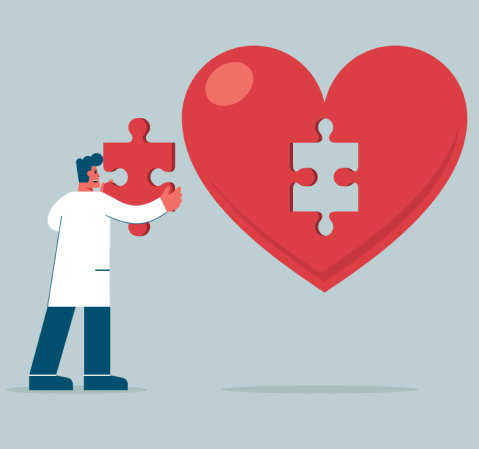
Feel free to reach out, and let's embark on a journey to better health together.
Caritas Hospital & Institute of Health Sciences is a licensed multi-organ transplantation centre (both deceased & live donor) with a team of outstanding doctors leading the Caritas Transplant Programme. We pride ourselves on our ability to offer the highest quality of care in Kidney, Liver, Heart and Stem Cell Transplantation. Being the organ transplant pioneers in the private sector in Central Travancore, we deliver the most unique pre and post-transplant management facilities through every step of the transplant process. When it comes to our heart transplant programme, we are backed by state-of-the-art technology and cutting-edge medical interventions. We have a proven track record of success in Heart, Liver, Stem Cell and Kidney Transplantation. Our highly trained doctors and their integrated team approach, and the excellent infrastructure help us to attain superior outcomes in transplant programmes.
A kidney transplant/renal transplant procedure is performed to replace a diseased kidney with a healthy kidney from a donor. The donated kidney can come from a deceased donor or a living person - a relative, spouse, or friend. A kidney transplant is often advised when a person suffers from end-stage renal disease. A working transplanted kidney does a better job of filtering wastes and is healthier than dialysis. Those who donate a kidney can lead a healthy life with one healthy kidney.
A liver transplant replaces a patient’s diseased liver with a whole or partially healthy liver from another person. It is the only cure for liver failure because no device or machine performs all functions of the liver. People who require a liver transplant may be affected by Acute Liver Failure or Chronic Liver Failure. Cirrhosis is one of the major conditions that affect the liver. Apart from Cirrhosis, certain conditions such as primary liver cancers, viral and acute hepatitis, acute hepatic necrosis, and autoimmune hepatitis also affect the functioning of the liver. Types of organ donors include brain-dead organ donors, cardiac-death organ donors and living donors. A divided liver can grow back to full size in both the living donor’s and the recipient’s bodies. The transplant process may usually take 6 to 12 hours.
A heart transplant is a surgery to remove a diseased heart from a person and replace it with a healthy one from an organ donor. Finding a donor heart is difficult. To remove the heart from the donor, two or more healthcare providers must declare the donor brain-dead. The transplant procedure is done only if the healthcare provider confirms that it is the best treatment choice for your heart failure. The healthcare team also makes sure the patient is healthy enough to go through the transplant process. After the transplant, medical care is advised for the rest of your life to avoid complications.
The stem cell transplant replaces unhealthy cells by adding new blood-forming stem cells into the bloodstream. Stem cells are made in the bone marrow and develop into different types of blood cells. This advanced procedure is an effective treatment for certain kinds of cancer, especially blood cancers such as leukaemia, lymphoma, and multiple myeloma. A stem cell transplant may also be used to treat certain genetic conditions and some noncancerous blood diseases.
Caritas Transplant Programme has a dedicated transplant team to provide all the information and support you need to keep going strong throughout your transplant journey. We have one of the biggest Critical Care teams in Kerala to provide life support for the transplant patients. Your queries and concerns are addressed with all due respect to ease your worries. Discuss the risks, benefits, organ transplant network, organ procurement, the process of matching, expenses and financial assistance, medications, the chances of rejections, and so on.

Evaluating the eligibility for a transplant by the medical team
Registering on Mrithasanjeevani (Kerala Network for Organ Sharing) waiting list. A living donor may also be identified and evaluated for living donation.
Building the support system
Planning the financial strategy
Waiting period
Transplant process upon receiving a matching donor organ
Managing post-transplant care